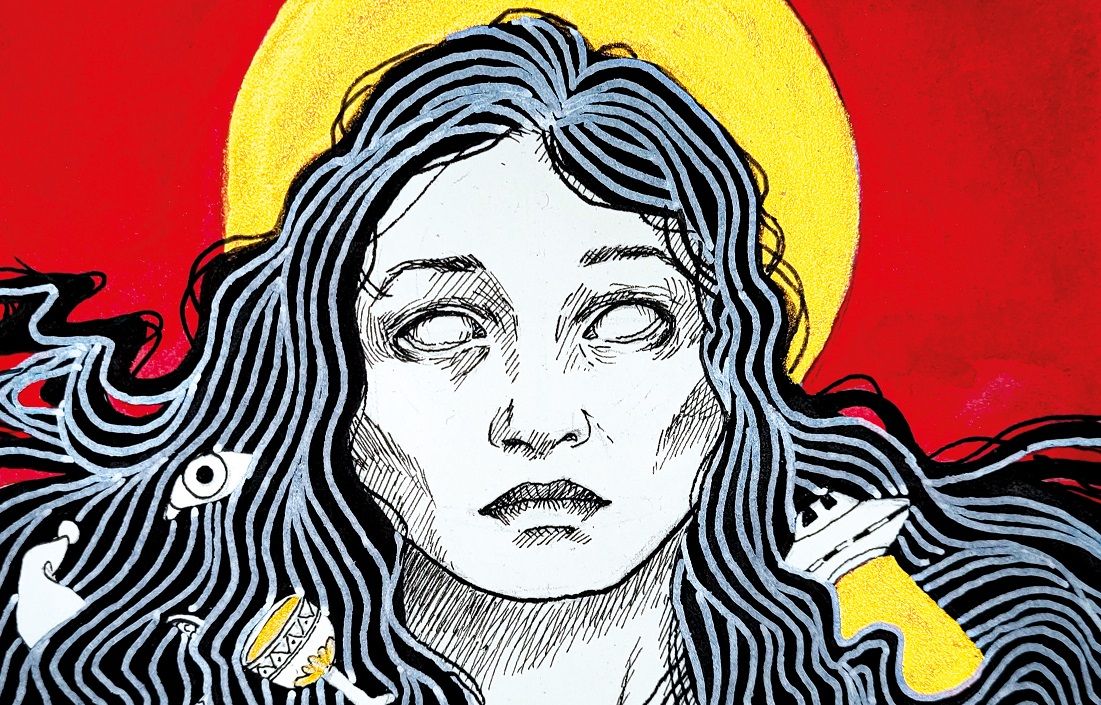Four out of ten Swedes believe in supernatural phenomena
Pressmeddelande

A new study from Uppsala University shows that 41 per cent of adult Swedes believe in some form of paranormal phenomenon. Illustration by Lotta Ilona Häyrynen.
Belief in phenomena such as ghosts, UFOs, the Great Lake monster and fortune tellers is common in all social groups in Sweden. A new study from Uppsala University shows that 41 per cent of adult Swedes believe in some form of paranormal phenomenon, and among women this figure is as high as 52 per cent. However, men are in the majority among those who believe in UFOs.
“Studies are few and far between, and I thought it was time to update the state of knowledge about the prevalence of various controversial beliefs, such as parapsychological abilities and hauntings. Even if you take a hostile view of these types of activities, surely it’s important to know how many people believe in them?” says Cristoffer Tidelius, a researcher on religion who has written the thesis Paranormal Sweden? Paranormal beliefs and practices in contemporary Sweden.
The study shows that around 41 per cent of adult Swedes confirm that they believe in paranormal phenomena, i.e. things that cannot be explained. However, there is a big difference between women and men, the figures being 52 per cent of women and 37 per cent of men. Tidelius points out there are parallels between religion and spirituality, with more women being believers.
“One possible explanation is that some paranormal ideas and practices appeal to traditionally female rather than male characteristics, such as a rich inner emotional life, self-knowledge and personal development, intuition, and taking care of oneself and others. These kinds of characteristics are often actively cultivated in alternative spirituality, alternative medicine and paranormal contexts.”
Tidelius’s research is based on a questionnaire study conducted in autumn 2020, with randomly selected participants via the Swedish Citizen Panel. It was sent to 1,900 individuals of whom over 1,100 responded. He has also made field studies accompanying ghost hunters in various parts of Sweden, spent four days training as a medium and taken a course on how to analyse UFO reports from the public. His research has also included interviews with 37 participants.
Another finding in the thesis is that among those who are actively engaged in organisations that are interested in paranormal phenomena, such as ghost hunters, ufologists and cryptozoologists, either women and men are equally represented or men are in the majority.
“This shows that some paranormal ideas and practices, particularly among those people who actively invest time and commitment, actually attract more men. International studies have also demonstrated that men are more inclined to believe in UFOs,” Tidelius notes.
One paradox that emerges is that most of those who believe in phenomena that are not as yet recognised by science nonetheless think that science is the most reliable source of knowledge.
“Religion and religious people, along with conspiracy theorists and their adherents, were some of the groups the enthusiasts least wanted to relate their own activities to,” Tidelius says.
The study also shows that there is a general, though weaker, correlation between paranormal beliefs and practices on the one hand, and tendencies towards conspiracist ideas on the other hand.
Tidelius, C, “Paranormal Sweden?: Paranormal beliefs and practices in contemporary Sweden”, Uppsala: Acta Universitatis Upsaliensis, 2024, https://uu.diva-portal.org/smash/record.jsf?pid=diva2%3A1821290&dswid=8991
For further information:
Cristoffer Tidelius, Doctor of Theology, Uppsala University,
email: cristoffer.tidelius@teol.uu.se, Mobile: +46 73 593 90 42
